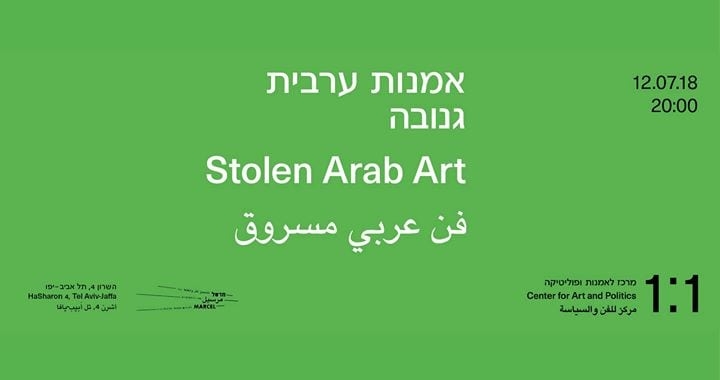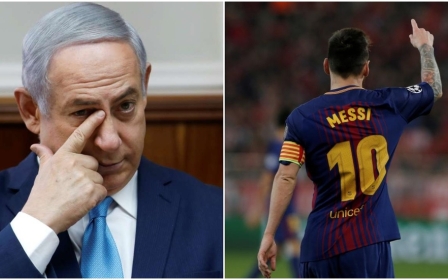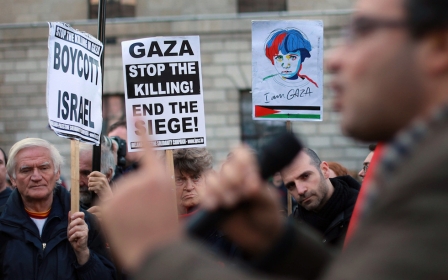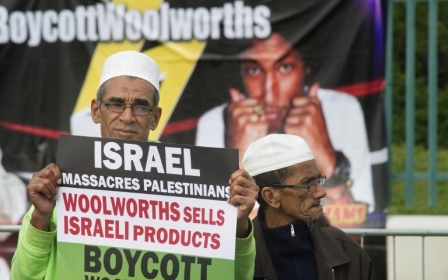Stolen Arab Art: Israeli exhibition showing Arab artwork without artists' consent

A startup Israeli art gallery has launched its first exhibition, Stolen Arab Art, in which works by prominent contemporary Arab artists are being purposefully shown without their consent or knowledge.
"We are showing the works in the exhibition in Israel without the artists' knowledge or consent, acutely aware of this act of expropriation," the 1:1 Centre for Art and Politics, a gallery in southern Tel Aviv, said in the exhibition's statement.
"By delineating these political and geographic boundaries we wish to call attention to Israel’s exclusion from the Middle East family," the gallery claimed.
A selection of four video artworks by six acclaimed artists from the Arab world are being shown in the exhibition, without crediting the artists or publishing their names.
Wael Shawky, an Egyptian artist whose artwork was shown in the exhibition, was livid.
"What is the point of being a thief and so proud of your act!" he told Middle East Eye via email. "This will never change anything - all these artists, including myself, are against showing in Israel. They [the gallery] made the point even clearer.”
'What is the point of being a thief and so proud of your act! This will never change anything - all these artists, including myself, are against showing in Israel' - Wael Shawky, Egyptian artist
Shawky added that he had raised the issue with his agents - the Lisson Gallery in London and the Sfeir-Semler Gallery in Beirut - to look into the possibility of taking the Israeli gallery to court. The Lisson Gallery did not confirm to MEE whether legal action would be taken.
Walid Raad, a Lebanese artist whose work was also identified as being shown in the exhibition, did not respond to request for comment by publication time.
Omer Krieger, the artistic director of the gallery, told Hebrew site Calcalist that he had sent the artists emails asking them to show their works in Tel Aviv, but that they either refused or did not engage with him at all.
"This time, it was a conscious choice for unilateral engagement. There was no attempt at coexistence or normalisation [in the show]," Krieger told Calcalist.
The gallery's statement said that the exhibition sought "to promote a shared reality marked by open dialogue and exchange throughout the Middle East, without wars, occupation, or any borders".
All that through the "Stolen Arab Art".
The gallery said that it decided not to publish the artists’ names based on "the assumption that they [the artists] would not want for their work to be shown in Israel, as part of the Arab and international cultural boycott of Israel".
The Palestinian Campaign for the Academic and Cultural Boycott of Israel (PACBI), a part of the broader Boycott, Divestment and Sanctions (BDS) movement, has played a prominent role in raising international awareness of Israeli crimes against Palestinians.
Palestinians have accused Israel of appropriating their culture, whether through culinary staples such as falafel, hummus and olive oil, or traditional clothing - without their consent in an attempt to erase Palestinian identity and ties to the land.
PACBI has played a large role in convincing artists not to perform in Israel, and was recently a driving force behind the Irish senate's vote on 11 July moving forward a bill banning the importation of products from Israeli settlements in the occupied West Bank.
Ireland became the first European Union nation to enforce such a boycott.
It also was vital in persuading the national team of Argentina to withdraw from a football match with Israel that was scheduled to take place in Jerusalem last month.
This article is available in French on Middle East Eye French edition.
New MEE newsletter: Jerusalem Dispatch
Sign up to get the latest insights and analysis on Israel-Palestine, alongside Turkey Unpacked and other MEE newsletters
Middle East Eye delivers independent and unrivalled coverage and analysis of the Middle East, North Africa and beyond. To learn more about republishing this content and the associated fees, please fill out this form. More about MEE can be found here.




